Israel resumed attacks on Iran on the second day of the conflict, following a night that saw waves of retaliatory missile strikes by Iran into Israel that left casualties on both sides. Read our report of day two as it unfolded.
Iran was mulling closing the Strait of Hormuz, a Revolutionary Guard commander told local media in an interview, as fighting continued into the second day of conflict.
Sardar Esmail Kowsari, said that closing the Strait of Hormuz "is under consideration, and Iran will make the best decision with determination."
More than 24 hours after Israel's initial strike on Iranian targets which killed three Iranian military commanders, the Israel Defense Forces (IDF) continued airstrikes on targets in Iran on Saturday.
"The [Israeli Air Force] continues to strike targets to remove threats in Iran," the IDF posted on Telegram on Saturday morning alongside footage of aerial strikes.
The development followed Iran’s launch of a wave of retaliatory missile strikes into Israel overnight and into Saturday morning in response to Israel's attacks on its nuclear facilities and missile sites.
Retaliatory strikes by Iran killed three people and injured dozens of others in Israel, while Iran's ambassador to the UN said 78 people were killed in Israeli strikes on Iran.
Read our report of the day's events as they unfolded.

 ${title}
${title}
Iranian president warns of 'more severe' response
Iranian President Masoud Pezeshkian has warned of a "more severe" response to come if Israeli attacks continue.
The president's office reported him saying that "continuation of Zionist aggression will be met with a more severe and powerful response from the Iranian armed forces".
The remarks were reportedly made during a phone call between Pezeshkian and Pakistani Prime Minister, Shehbaz Sharif.
Iran state-backed media reports drone attack, explosion in south
Iran’s Islamic Revolutionary Guard Corps-backed Fars news agency has reported a large fire breaking out following an alleged Israeli drone attack on facilities in the Pars gas field. Earlier the same news agency reported claims that a strong explosion had shaken Kangan harbour in southern Iran's Bushehr province.
You will soon see Air Force planes in Tehran's skies striking every site and target - Netanyahu
Israeli Prime Minister Benjamin Netanyahu has been delivering a televised address from his office.
He said that Israel’s goal is “to thwart Iran's dual threat of nuclear weapons and ballistic missiles”.
“We targeted the team of scientists leading [Iran’s] nuclear project,” Netanyahu said. He said that he couldn’t go into more details on this but he added: “We have achieved achievements and will not allow Iran to acquire a nuclear weapon.”
“Iran has 20,000 ballistic missiles and we have taken measures to destroy its missile capabilities,” he said.
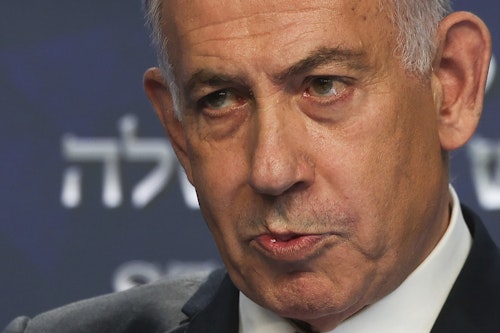
“You will soon see Air Force planes in Tehran's skies striking every site and target,” he added.
Why Strait of Hormuz matters
Following up on the news that Iran is considering closing the Strait of Hormuz, here's a piece explaining why that might matter for Europe.
What’s at stake for Europe if Strait of Hormuz is blocked?
Iran is considering closing the Strait of Hormuz, but what would that mean for Europe and what is at stake if it happens? #EuropeNews
G7 summit kicks off in Canada amid global tensions
Leaders of the G7 countries are gathering from tomorrow in Kananaskis, Alberta, for a three-day summit hosted by Canadian PM Mark Carney. While the official agenda focuses on global peace, economic growth, and the digital transition, much of the attention is expected to shift to the escalating conflict between Israel and Iran.
The G7—Canada, France, Germany, Italy, Japan, the UK, the US and the EU—will also discuss the war in Ukraine, trade tensions, and energy security. But with Iran now retaliating after Israeli strikes and attempted nuclear negotiations between the US and Iran now seemingly on ice, the Middle East crisis seems likely to dominate.
Canada has also invited leaders from India, Saudi Arabia, and Ukraine. With no final joint statement expected this year, Canadian PM Carney hopes to present a united front.
US-Iran nuclear talks now unlikely after Israeli airstrikes
Talks between the US and Iran on Tehran’s nuclear programme were due to take place in Oman tomorrow — but are now in doubt after Israel’s massive airstrikes on Iran.
The Israeli attack hit nuclear sites and killed several senior Iranian officials, including scientists and one key negotiator.
Neither side has officially cancelled the talks, but experts say the chances of them going ahead are now slim. The US had pushed for Iran to stop all uranium enrichment. Iran wanted to keep its civilian nuclear programme and end US sanctions.
Iran warns France, UK and US of retaliation if they help Israel – but will they?
Iranian state media has reported that Iran has warned France, the UK and US not to help Israel stop its strikes on the country. Iran will target ships and bases belonging to the UK, US and France, if they defend Israel against Iranian drones or missiles, according to the state media.
What do we know about where the three stand on assisting Israel so far?
When Iran has targeted Israel with drones in the past, the UK has sent RAF Typhoon jets from Cyprus to shoot them down. The UK has not taken part in any military action this time including efforts to defend Israel against strikes.
“Military planners inside the Ministry of Defence were braced for the strikes on Thursday night. However, the UK appeared to have been cut out of the loop on the operation, despite being involved in previous strikes,” the Times reported today.
"We support Israel's security and if Israel were to be attacked, France would take part in operations to defend Israel if it is in a position to do so," Macron said on Friday during a press conference, though he made clear that France wouldn't participate "in any offensive operation".
"We have always favoured the diplomatic route [on the issue of Iranian nuclear and ballistic missiles] rather than military intervention, so France did not recommend attacks by Israel," he said, underlining that France "didn't plan this decision with Israel".
Meanwhile President Donald Trump was asked in a press huddle on Friday whether the US would support Israel under attack. He replied “I support Israel,” without elaborating.
“We’ve been very close to Israel. We’re their number one ally by far," Trump told Reuters, adding, "We'll see what happens."
Iran mulling closure of strait of Hormuz - Iranian MP
Iran is mulling closing the Strait of Hormuz, a Revolutionary Guard commander has told local media in an interview, Euronews Persia desk has verified. Sardar Esmail Kowsari, said that closing the Strait of Hormuz "is under consideration, and Iran will make the best decision with determination."
"Our hands are wide open when it comes to punishing the enemy, and the military response was only part of our overall response," added Kowsari, who is a member of parliament in addition to his military position.
Blocking the Strait of Hormuz was one of four Iranian response including terrorist acts on mainland Europe which security expert Claude Moniquet cited as possible Iranian responses to the Israeli attacks in an interview with Euronews. It would be “a disaster for Europe”, the former French intelligence office said.
How hard did Israel hit at nuclear sites?
Israel launched large-scale strikes targeting Iranian nuclear facilities in Natanz, Fordow and Isfahan, damaging above-ground facilities and raising questions about the true extent of the damage. What really happened in these sensitive locations? Euronews Arabic desk has looked into it.
· Natanz nuclear facility
The vast Natanz nuclear complex is the country's main uranium enrichment facility, with an underground and an above-ground site.
Jeffrey Lewis, a non-proliferation expert at the Middlebury Institute of International Studies, said the damage to the Natanz facility was "moderate," noting that Israel had destroyed a pilot fuel enrichment facility and some supporting buildings associated with energy supplies.
He said the strikes hit a support building near two underground uranium enrichment facilities, but there was no damage to the underground facilities or the nearby mountain facility.
The International Atomic Energy Agency confirmed that the above-ground enrichment plant at the Natanz site was destroyed, and that no increase in radiation levels was recorded.
· Isfahan
Behrouz Kamalvandi, spokesman for the Atomic Energy Organization of Iran, said of Isfahan - one of Iran's largest nuclear sites and one of the most prominent secret research centres linked to weapons development – that the attacks caused fires, without direct damage to sensitive facilities.
· Limited damage at Fordow facility
Kamalvandi also said on Saturday that limited damage was caused to the Fordow nuclear reactor site near the city of Qom, in addition to other facilities including a building for the production of metallic uranium, infrastructure for converting enriched uranium, and laboratories.
He explained that some minor damage was caused to the Fordow site, but it is not technically serious, stressing that the preventive measures taken previously prevented significant or human losses.
Kamalvandi said that sensitive equipment and information were evacuated from nuclear plants before the attacks were carried out, noting that there was no risk of radioactive contamination or a threat to public health.
He stressed that restoration operations have already begun, and the damaged person will be rebuilt with higher quality than before, taking advantage of local scientific and technical capabilities.
IAEA Reaction
The International Atomic Energy Agency confirmed that the Bushehr nuclear plant on Iran's coast in the Persian Gulf "was not targeted" and that "no increase in radiation levels was recorded at the Natanz site."
Scenes of destruction in Israel after Iranian missile attack
New images show damaged buildings and debris in the Israeli cities of Rishon LeZion and Tel Aviv after Iran launched multiple missile attacks.
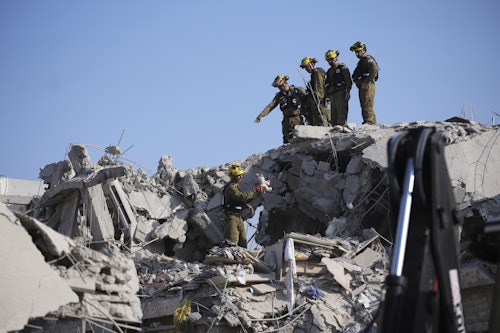
Israeli security forces inspect destroyed houses that were struck by a missile fired from Iran, in Rishon Lezion, Israel on Saturday, June 14, 2025. (AP Photo/Ohad Zwigenberg)
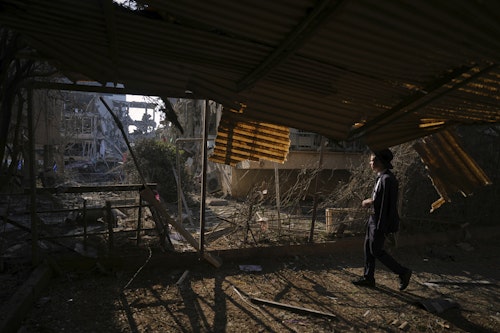
A person looks out at a destroyed residential building that was hit by a missile fired from Iran, in Ramat Gan, near Tel Aviv, Israel, on Saturday, June 14, 2025. (AP Photo/Ariel Schalit)
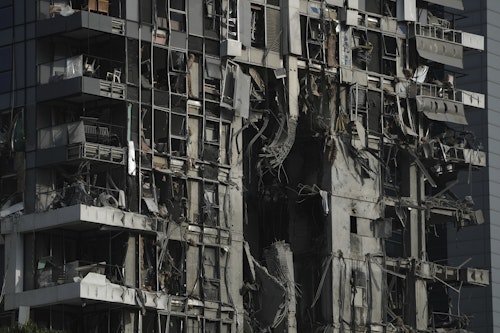
A residential building that was struck by a missile fired from Iran, is seen in Tel Aviv, Israel, on Saturday, June 14, 2025. (AP Photo/Leo Correa)
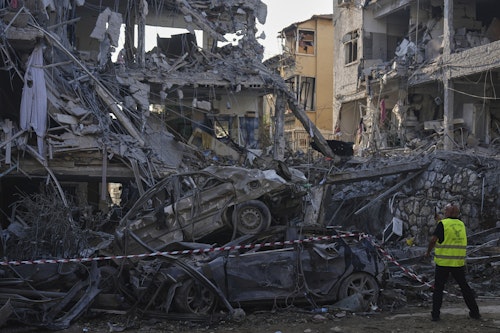
Israeli security forces inspect destroyed residential buildings that were hit by a missile fired from Iran, in Ramat Gan, near Tel Aviv, Israel, on Saturday, June 14, 2025. (AP Photo/Ariel Schalit)
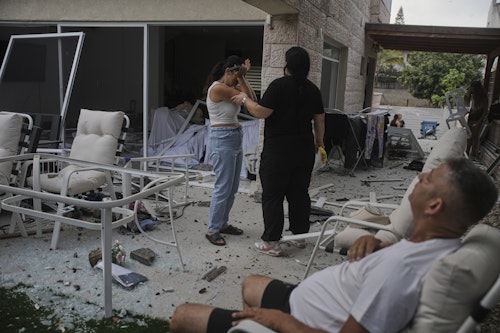
Residents react after their home was struck by a missile launched from Iran, in Rishon Lezion, Israel, on Saturday, June 14, 2025. (AP Photo/Ohad Zwigenberg)
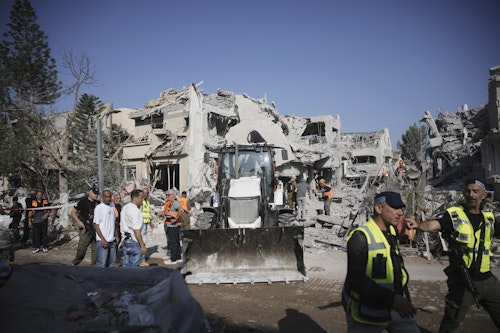
Israeli security forces inspect the site of homes destroyed by a missile fired from Iran, in Rishon Lezion, Israel, on Saturday, June 14, 2025. (AP Photo/Ohad Zwigenberg)
Foreigners evacuate Iran for Azerbaijan
Foreigners caught in Iran have been travelling by land to the country’s borders to leave, according to Euronews’ sources familiar with the issue.
Russia’s Tchaikovsky Symphony Orchestra, a 51-member delegation, and nearly 90 actors and cultural figures evacuated safely into Azerbaijan after a long travel to the border, the sources said.
“We travelled for a very long time [to get to the border] and stayed here for a long time, practically in a holding area on the Iranian side,” said Producer Timur Jafarov, who was part of the group.
“It’s clear what the situation is there [in Iran] — they’re all just as confused and unsure about what’s happening,” he said.
The party received humanitarian assistance once they arrived in Azerbaijan from the local authorities.
“A huge thank you. This feels like home — and that feeling is incredible,” said Jafarov.
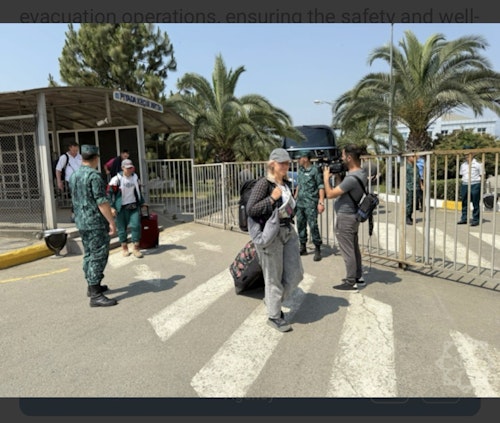
Iranian regime clamps down on press
Iran's Revolutionary Guard has issued a stark warning on communications deemed favourable to Israel in a statement on social media Telegram.
The head of Euronews Persia desk Babak Kamiar explained what a chilling effect this would have on media.
Iranian regime muzzles media with grim death penalty warning
Revolutionary Guard issues statement warning that any ‘exchange of information’, including news reports, seen as benefiting Israel will be punished with the ma…
Iran’s missile stockpile tops 3,000 - but Israel’s can strike much farther
Iran is estimated to have more than 3,000 ballistic missiles, making it one of the largest missile stockpiles in the Middle East, according to The Wall Street Journal. Most of these missiles are short- to medium-range and domestically built, with at least 12 different types in service. Their range varies from 150 km (Tondar 69) to 2,000 km (Khorramshahr and Sejjil), based on data from the Missile Defense Project at CSIS, cited by Al Jazeera.
Israel, by comparison, has fewer ballistic missiles but a much longer reach. Its arsenal includes at least four types, from the short-range LORA (280 km) to the Jericho-3, which can reportedly hit targets as far as 6,500 km away, well beyond the range of any known Iranian missiles.
In the AP picture below, released by the Iranian Defence Ministry on Thursday, May 25, 2023, Khorramshahr-4 missile is launched at an undisclosed location, Iran.
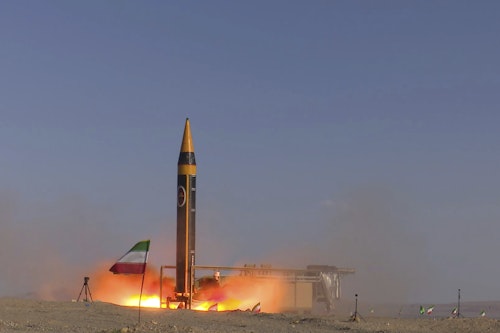
Israeli and Iranian strikes leave over 100 dead, including civilians and commanders
According to media reports and the Israeli military, four waves of Iranian missile attacks on Israel on Friday night and early Saturday have resulted in 3 deaths and 80 injuries as of the time of reporting. Two of the three Israeli civilians were killed when Iranian missiles struck residential buildings in the city of Rishon LeZion.
Iranian media report that Israeli airstrikes on Iran have left 78 dead and 329 injured in Tehran, and 18 dead and 35 injured in East Azerbaijan province (Tabriz). Iran’s representative to the United Nations stated that the “vast majority” of the casualties from the Israeli attacks are civilians.
The Israeli strikes also killed at least 20 high-ranking commanders and senior officers of Iran’s military and the Islamic Revolutionary Guard Corps (IRGC).
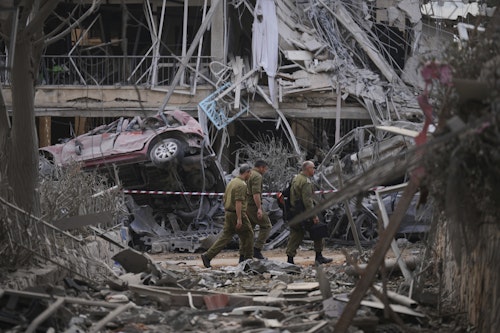
Israeli security forces inspect destroyed residential buildings that were hit by a missile fired from Iran, in Ramat Gan, near Tel Aviv, Israel, on Saturday, June 14, 2025. (AP Photo/Ariel Schalit)
'Tehran will burn' - Israeli defence minister
"Tehran will burn" if Iran continues to launch missiles into Israel, Israeli defence minister, Israel Katz has said.
"The Iranian dictator is turning the citizens of Iran into hostages and creating a reality in which they, especially the residents of Tehran, will pay a heavy price for the criminal attack on Israeli civilians," Katz said during a joint assessment with military officials.
Picture: Israel Katz AP
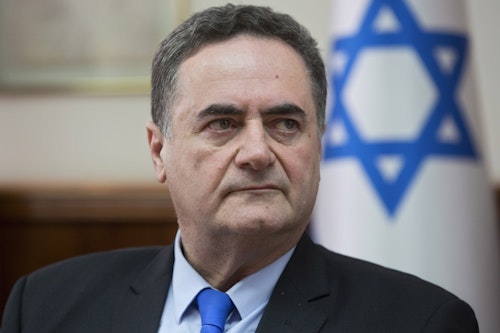
Israeli strikes follow targeting of Iranian air defence
Earlier today IDF Chief of Staff Lt Gen Eyal Zamir and Israeli Air Force chief Maj Gen Tomer Bar gave a joint situational assessment, saying "the way to Iran has been paved", a likely reference to yesterday's targeting by Israel of Iranian air defence installations. “According to the plans, air force fighter jets will begin to carry out strikes on targets in Tehran,” they added. Reported blasts in Iran suggest those strikes are now under way.
Meanwhile the Israeli military claimed that the country's air force hit "dozens" of targets in Tehran overnight, including surface-to-air missile infrastructure. Maj Gen Tomer Bar said in a statement that the strikes had "operational and national significance".
More blasts hit northwest and west Iran
New explosions were reported today in parts of western and north western Iran, according to Islamic Revolutionary Guard Corps managed media, the Fars News Agency. The Israeli military is said to have carried out new missile strikes targeting key military bases in the region.
The attacks reportedly hit the city of Tabriz in the northwest, as well as areas in the provinces of Lorestan, Hamedan and Kermanshah in western Iran.
Pope urges dialogue and responsibility amid escalating tensions in the Middle East
Pope Leo XIV raised the alarm today over the worsening situation between Iran and Israel, saying the crisis comes at a “very delicate time”. Speaking during his weekly public audience, he called on all sides to act with “responsibility and reason” and to choose dialogue over threats.
The Pope repeated his appeal for a world without nuclear weapons and urged countries to support peace efforts that protect everyone’s safety and dignity. “No one should ever threaten the existence of another,” he said.
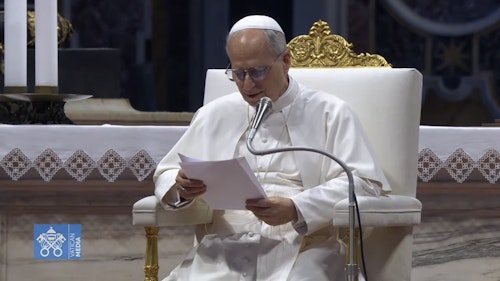
Middle East balance of power has tilted dramatically to Israel - Expert
In case you missed it, here's an interview Euronews' Sandor Zsiros did yestedray with security expert Claude Moniquet, who told Euronews that Iran has suffered a huge military failure, changing the balance of power in the Middle East dramatically. Israeli and American interests in Europe might be at risk in the coming days, he said.
Moniquet, who served as an intelligence officer in the French services and has written several books about the region, told Euronews that Iran has limited capacities to hit back, but he warned that terrorism in Europe could be one repercussion.
Middle East power balance has tilted dramatically to Israel - Expert
Security expert Claude Moniquet told Euronews that Iran has suffered a huge military failure, changing the balance of power in the Middle East dramatically. Is…
Casualties on both sides following first day of conflict
As the conflict moves into its second day here’s an update on developments so far:
· The Israeli Defence Forces said "dozens" of Iranian missiles were launched into Israel in multiple waves of strikes in the early hours of Saturday.
· Sirens and the boom of explosions, possible from Israeli interceptors, could be heard in the sky over Jerusalem and Tel Aviv.
· Ichilov hospital in Tel Aviv said it has treated seven people hurt by the second Iranian barrage; six had light injuries and the seventh was moderately wounded. At least 34 people were injured in Tel Aviv during the first wave of strikes.
· Israeli newspaper Haaretz wrote that direct hits were reported in central Israel, wounding five people. It said several buildings were hit by Iranian missiles.
· European Commission President Ursula Von Der Leyen posted on X late on Friday that she had called Israeli President Isaac Herzog, and urged "all parties to act with maximum restraint and work to de-escalate the situation."
· The sound of explosions and Iranian air defence systems firing at targets was also echoing across the centre of Iran's capital, Tehran, shortly after midnight on Saturday.
· Iran’s semi-official Tasnim news agency reported a fire at Tehran’s Mehrabad International Airport, posting a video on X of a column of smoke and orange flames rising from what the outlet said was the airport.











